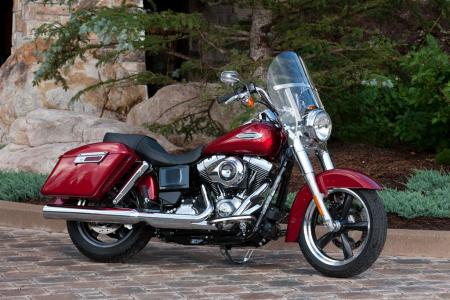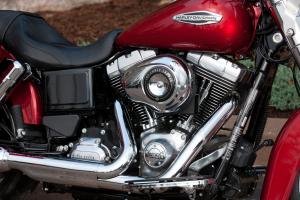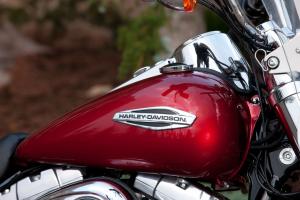Harley-Davidson’s new Switchback offers built-in touring features that give it the flexibility to go from Dyna-based boulevard profiler to weekend warrior in a matter of minutes.
The Switchback joins the CVO Softail Convertible as the latest motorcycle from Harley that can morph from a laidback, cool guy cruiser to a modest touring machine in a heartbeat by virtue of quick-release saddlebags and windscreen. The CVO Convertible, now in its third year, sets itself apart as a member of the CVO family by adding in a quick-release passenger backrest, an MP3 player-capable sound system and numerous upscale treatments that only CVO motorcycles enjoy.
2011 Bagger Shootout. The TC103 is now standard in all FL (Touring) models, Softails and Dynas, save for the Street Bob and Super Glide Custom. Keeping the Twin Cam 96 in the Street Bob and SG Custom was more a matter of maintaining a price point for these models rather than randomly denying them the upgrade to the 103, according to Harley-Davidson.
In order to make good on the claim that the Switchback is “all about the handling,” Harley’s team of engineers weren’t going to simply tweak the front-end of an existing model in the Dyna platform to fit the SB – a new front-end was crafted specifically for this cruiser/tourer.
While both 41mm fork tubes employ triple-rate springs, the SB’s fork also uses a cartridge assembly rather than the less sophisticated damping-rod technology found on many cruiser motorcycles. According to Harley’s staff, utilizing cartridge-type damping in only the left fork leg proved an efficient method to achieve the advanced levels of damping engineers were after while helping to reduce the bike’s overall weight.
A great front-end ’tisn’t much without a balanced rear.
Eschewing the more traditional dual coil-over spring shocks found routinely on many cruisers, the Switchback instead benefits from a pair of 5-way preload adjustable nitrogen-charged, “cigar tube” (monotube) emulsion shocks. This rear suspension, says Harley’s Bjorn Christensen, better matches the ride comfort and handling performance of the front-end than does suspension action from traditional coil-overs.
Front suspension travel of 3.8 inches, and 2.1 inches for the rear, doesn’t sound like a significant difference from many of Harley’s cruisers, but don’t let these numbers fool you into thinking the Switchback provides less than average ride comfort.
The SB’s plush saddle sits 27.1 inches off the tarmac and offers CVO-seat levels of comfort. However, it’s the suspension package that deserves most of the kudos for providing remarkable-for-a-cruiser bump damping. The SB’s suspenders gobbled up most road imperfections without effort; it was only the most cavernous expansion joints or chuckholes that succeeded in overcoming the Switchback’s firm but compliant fork and shocks.
New five-spoke cast-aluminum wheels (18-inch front, 17-inch rear) were designed for weight savings – again to aid in the goal of giving the Switchback quick, low-effort handling – as well as style. Concern for handling performance even extends to the headlight.
The headlamp assembly is a sizeable unit that sits on the highest portion of the fork, raising the bike’s CoG, and therefore impacts the amount of energy required to swing the bar left or right to initiate a turn. In light of this, Harley opted for the weight savings offered by die-cast aluminum (compared to the usual steel used for the headlight housing) when it came time to choose materials to fabricate the nacelle.
After a day’s worth of riding freeways, 25-mph surface streets and meandering canyon two-laners, my time aboard the Switchback in these environments allowed me to give the SB the guilty verdict: guilty of handling and riding as advertised.
Harley has achieved in the SB the low-effort steering it set out to give this new motorcycle from day one. The ’Back’s handling/steering is also accurate as well as easy. The chassis remains composed throughout a corner’s arc – even while dragging the floorboards past the Switchback’s 29-degree lean angle (left and right sides).
Reeling in the Switchback’s 718-lb curb weight is the work of a single 300mm rotor/4-piston front caliper combo, and a 292mm rotor with single 2-piston caliper for the rear. The brake set performs sufficiently, offering decent stopping force. Our test unit was fitted with Harley’s simple but effective ABS system – an option for all 2012 Dynas, as well as many other non-Sportster Harleys.
The SB’s quick-release windshield deflected windblast from my 5-foot 8-inch frame, keeping my helmet visor bug-free and my torso relaxed since buffeting was virtually nonexistent. I also found the rider triangle ideal, with no amount of discomfort in my reach to the mini-ape handlebar, my hands falling naturally to the grips. Seat-to-floorboard relation was also close to ideal – my only wish is for a heel-toe-shifter instead of the solo toe shifter gracing the SB.
According to the Switchback’s lead engineer, Brian Scherbarth, the single-sided exhaust and dual hard-shell saddlebags were designed specifically to this motorcycle, with styling as a key focus.
I usually find the symmetry of dual exhausts more visually appealing, but also realize the added physical weight of such a design. The long, right-side-mounted single pipe the SB exhales through is a styling coup; the absence of a pipe on the left side goes largely unnoticed. Exhaust sound, too, was zeroed-in on by Harley.
Anymore I expect most 45-degree V-Twins to sound nearly identical regardless of displacement thanks to EPA edicts. Somehow, though, the Switchback’s tone stood out to me as ideally throaty and bossy while the Twin was under load. And yet the single can was satisfactorily muted while idling at a stop next to Officer Scowler.
In order to keep the Switchback’s silhouette trim and alluring, its hardbags had to depart from the design used for Harley’s other hard saddlebag systems. Ultimately, the SB’s bags had to lose volume to meet styling criteria.
According to Scherbarth, the Switchback’s luggage has 25% less volume than FL model bags, holding 15 lbs per bag compared to the bags on, say, the Street Glide or Road King that can handle up to 25 lbs of your stuff. Where the hardbags on the FL models require removal of two Dzus fittings and a bit of finagling to remount, the Switchback’s bags only need an outward pull and twist of a single dial located on the bags’ interior edge, followed by an affirmative rearward push on the bag for complete removal. A practiced hand can remove a bag in just a few seconds, with installation taking slightly longer.
The SB’s bags’ outward facing lid latch is familiar looking; a ringer for the latch on FL models. However, due to space constraints, the Switchback’s lid hook (on the inner/bike-side edge) required a complete redesign from the dual latching hooks of the FL’s bags.
Had the FLs’ latch system been utilized on the new SB, the SB’s bags would’ve been forced too far away from the rear fender/saddle area, creating an unsightly gap. An unfortunate drawback of this fresh lid latch design for the Switchback is that the engagement point for the lid’s clasping mechanism (the latch on the bike side, not the visible chrome closing latch on the outside of the lid) is too shallow to hold the lid shut securely 100% of the time.
On the particular Switchback I rode, the right-side box lid either popped open entirely while riding (at least once) or failed to mesh perfectly with the box, resting askew of the box, either at the front or rear corner. Taking time to deliberately and slowly close the lid, listening and looking as best as possible for some indication of positive and secure engagement, I then purposely pulled up with force on the lid only to have it pop open every other time.
At day’s end Scherbarth revealed to me a trick necessary to ensure the lid was latched: once the lid is resting atop the saddlebag a slight outward push of the lid from its inner edge (fender side, at the lid’s inner hook area) will then properly align the lid to the rest of the box, at which time you can push shut the outer latch/lock.
Scherbarth admitted that any number of future owners/riders will likely encounter this same nuance of a less-than-perfect fit, and acknowledged the design could improve. Scherbarth was working on a redesign at the time. Regrettably, he was visualizing and verbalizing this latch makeover real-time while running me through the above lid-closing trick, rather than months ago when in the design lab.
My best guess as to what drives a company to look beyond a known issue like this is an accepted risk that hopefully most of the time the product will work as designed. As for those that don’t, well, it looks like a case-by-case basis for resolution.
Two Harleys for the price of one
At $15,999 the 2012 Harley-Davidson Switchback offers a lot of motorcycle for the money. It is at heart a Saturday night boulevard prowler, but its light, accurate handling and generally unflappable chassis belie the laidback appearance it sports when the bags ‘n’ blade are stowed in the garage.
When the weekend or a few extra days off from self-imposed illness roll around, the SB provides lockable, removable storage for a couple days’ worth of whatcha got, paired to solid wind protection that’ll keep you from arriving at your destination beat up by windblast and weather.
The noted sometimes-poor operation of one bag lid was a disappointment for a wholly new model from Harley-Davidson, but otherwise H-D has hit its mark with the Switchback.
Source : motorcycle.com
The Switchback joins the CVO Softail Convertible as the latest motorcycle from Harley that can morph from a laidback, cool guy cruiser to a modest touring machine in a heartbeat by virtue of quick-release saddlebags and windscreen. The CVO Convertible, now in its third year, sets itself apart as a member of the CVO family by adding in a quick-release passenger backrest, an MP3 player-capable sound system and numerous upscale treatments that only CVO motorcycles enjoy.
2011 Bagger Shootout. The TC103 is now standard in all FL (Touring) models, Softails and Dynas, save for the Street Bob and Super Glide Custom. Keeping the Twin Cam 96 in the Street Bob and SG Custom was more a matter of maintaining a price point for these models rather than randomly denying them the upgrade to the 103, according to Harley-Davidson.
In order to make good on the claim that the Switchback is “all about the handling,” Harley’s team of engineers weren’t going to simply tweak the front-end of an existing model in the Dyna platform to fit the SB – a new front-end was crafted specifically for this cruiser/tourer.
While both 41mm fork tubes employ triple-rate springs, the SB’s fork also uses a cartridge assembly rather than the less sophisticated damping-rod technology found on many cruiser motorcycles. According to Harley’s staff, utilizing cartridge-type damping in only the left fork leg proved an efficient method to achieve the advanced levels of damping engineers were after while helping to reduce the bike’s overall weight.
A great front-end ’tisn’t much without a balanced rear.
Eschewing the more traditional dual coil-over spring shocks found routinely on many cruisers, the Switchback instead benefits from a pair of 5-way preload adjustable nitrogen-charged, “cigar tube” (monotube) emulsion shocks. This rear suspension, says Harley’s Bjorn Christensen, better matches the ride comfort and handling performance of the front-end than does suspension action from traditional coil-overs.
Front suspension travel of 3.8 inches, and 2.1 inches for the rear, doesn’t sound like a significant difference from many of Harley’s cruisers, but don’t let these numbers fool you into thinking the Switchback provides less than average ride comfort.
The SB’s plush saddle sits 27.1 inches off the tarmac and offers CVO-seat levels of comfort. However, it’s the suspension package that deserves most of the kudos for providing remarkable-for-a-cruiser bump damping. The SB’s suspenders gobbled up most road imperfections without effort; it was only the most cavernous expansion joints or chuckholes that succeeded in overcoming the Switchback’s firm but compliant fork and shocks.
New five-spoke cast-aluminum wheels (18-inch front, 17-inch rear) were designed for weight savings – again to aid in the goal of giving the Switchback quick, low-effort handling – as well as style. Concern for handling performance even extends to the headlight.
The headlamp assembly is a sizeable unit that sits on the highest portion of the fork, raising the bike’s CoG, and therefore impacts the amount of energy required to swing the bar left or right to initiate a turn. In light of this, Harley opted for the weight savings offered by die-cast aluminum (compared to the usual steel used for the headlight housing) when it came time to choose materials to fabricate the nacelle.
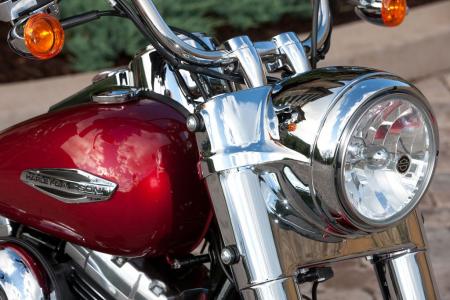 Harley-Davidson looked at numerous ways to facilitate low-effort steering in the Switchback. Even the headlight housing was considered: die-cast aluminum was used instead of heavier steel. |
Harley has achieved in the SB the low-effort steering it set out to give this new motorcycle from day one. The ’Back’s handling/steering is also accurate as well as easy. The chassis remains composed throughout a corner’s arc – even while dragging the floorboards past the Switchback’s 29-degree lean angle (left and right sides).
Reeling in the Switchback’s 718-lb curb weight is the work of a single 300mm rotor/4-piston front caliper combo, and a 292mm rotor with single 2-piston caliper for the rear. The brake set performs sufficiently, offering decent stopping force. Our test unit was fitted with Harley’s simple but effective ABS system – an option for all 2012 Dynas, as well as many other non-Sportster Harleys.
The SB’s quick-release windshield deflected windblast from my 5-foot 8-inch frame, keeping my helmet visor bug-free and my torso relaxed since buffeting was virtually nonexistent. I also found the rider triangle ideal, with no amount of discomfort in my reach to the mini-ape handlebar, my hands falling naturally to the grips. Seat-to-floorboard relation was also close to ideal – my only wish is for a heel-toe-shifter instead of the solo toe shifter gracing the SB.
The Switchback’s chassis is notably composed. And so is photog Brian J. Nelson’s exposure… |
I usually find the symmetry of dual exhausts more visually appealing, but also realize the added physical weight of such a design. The long, right-side-mounted single pipe the SB exhales through is a styling coup; the absence of a pipe on the left side goes largely unnoticed. Exhaust sound, too, was zeroed-in on by Harley.
Anymore I expect most 45-degree V-Twins to sound nearly identical regardless of displacement thanks to EPA edicts. Somehow, though, the Switchback’s tone stood out to me as ideally throaty and bossy while the Twin was under load. And yet the single can was satisfactorily muted while idling at a stop next to Officer Scowler.
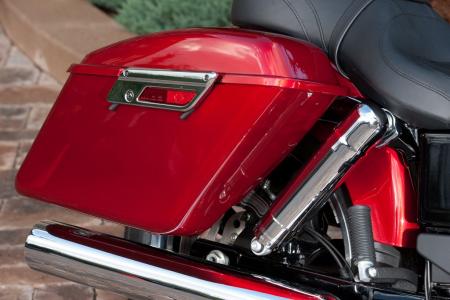 Chrome finishes are lustrous, including the up-spec mono-tube shocks. Paint finish on the Switchback’s hardbags is top-notch. Regrettably the bags’ inner latch leaves something to be desired. |
According to Scherbarth, the Switchback’s luggage has 25% less volume than FL model bags, holding 15 lbs per bag compared to the bags on, say, the Street Glide or Road King that can handle up to 25 lbs of your stuff. Where the hardbags on the FL models require removal of two Dzus fittings and a bit of finagling to remount, the Switchback’s bags only need an outward pull and twist of a single dial located on the bags’ interior edge, followed by an affirmative rearward push on the bag for complete removal. A practiced hand can remove a bag in just a few seconds, with installation taking slightly longer.
The SB’s bags’ outward facing lid latch is familiar looking; a ringer for the latch on FL models. However, due to space constraints, the Switchback’s lid hook (on the inner/bike-side edge) required a complete redesign from the dual latching hooks of the FL’s bags.
Had the FLs’ latch system been utilized on the new SB, the SB’s bags would’ve been forced too far away from the rear fender/saddle area, creating an unsightly gap. An unfortunate drawback of this fresh lid latch design for the Switchback is that the engagement point for the lid’s clasping mechanism (the latch on the bike side, not the visible chrome closing latch on the outside of the lid) is too shallow to hold the lid shut securely 100% of the time.
On the particular Switchback I rode, the right-side box lid either popped open entirely while riding (at least once) or failed to mesh perfectly with the box, resting askew of the box, either at the front or rear corner. Taking time to deliberately and slowly close the lid, listening and looking as best as possible for some indication of positive and secure engagement, I then purposely pulled up with force on the lid only to have it pop open every other time.
At day’s end Scherbarth revealed to me a trick necessary to ensure the lid was latched: once the lid is resting atop the saddlebag a slight outward push of the lid from its inner edge (fender side, at the lid’s inner hook area) will then properly align the lid to the rest of the box, at which time you can push shut the outer latch/lock.
Scherbarth admitted that any number of future owners/riders will likely encounter this same nuance of a less-than-perfect fit, and acknowledged the design could improve. Scherbarth was working on a redesign at the time. Regrettably, he was visualizing and verbalizing this latch makeover real-time while running me through the above lid-closing trick, rather than months ago when in the design lab.
My best guess as to what drives a company to look beyond a known issue like this is an accepted risk that hopefully most of the time the product will work as designed. As for those that don’t, well, it looks like a case-by-case basis for resolution.
Two Harleys for the price of one
At $15,999 the 2012 Harley-Davidson Switchback offers a lot of motorcycle for the money. It is at heart a Saturday night boulevard prowler, but its light, accurate handling and generally unflappable chassis belie the laidback appearance it sports when the bags ‘n’ blade are stowed in the garage.
When the weekend or a few extra days off from self-imposed illness roll around, the SB provides lockable, removable storage for a couple days’ worth of whatcha got, paired to solid wind protection that’ll keep you from arriving at your destination beat up by windblast and weather.
The noted sometimes-poor operation of one bag lid was a disappointment for a wholly new model from Harley-Davidson, but otherwise H-D has hit its mark with the Switchback.
Based on the flexibility of offering two-bikes-in-one, Harley has hit one out of the park again with its latest cruiser-cum-tourer, the Switchback. Its saddlebag latches are our only concern. |
